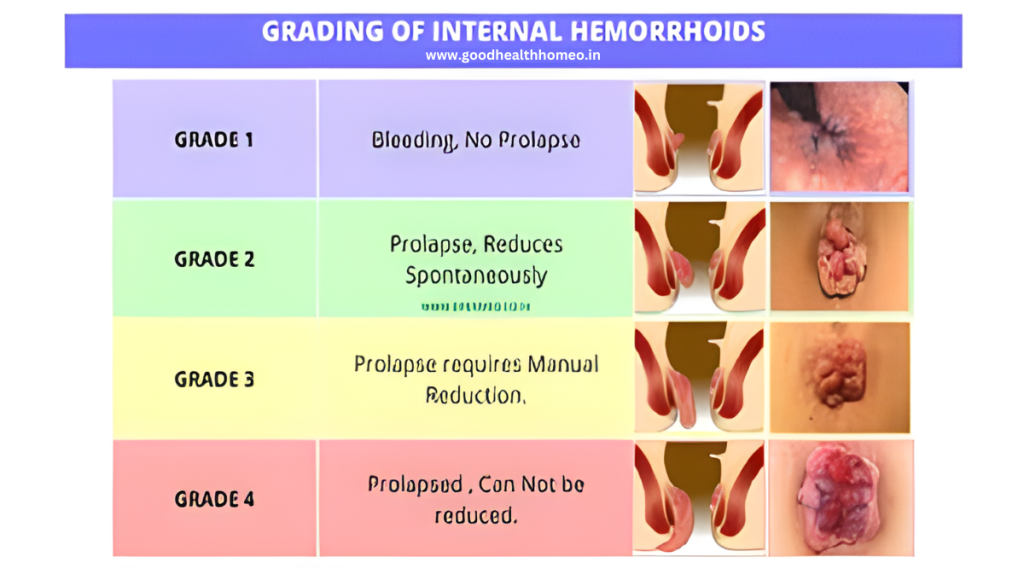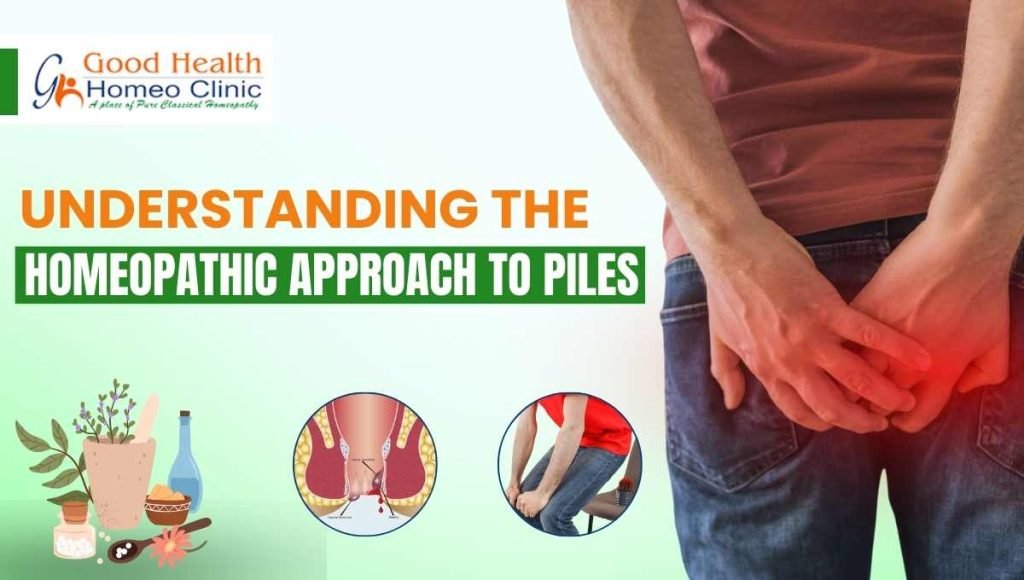Piles, also known as haemorrhoids, are a common but often distressing condition affecting many people worldwide. The discomfort and pain associated with piles can significantly impact one’s quality of life. At Good Health Homeo, we believe in providing comprehensive and holistic solutions through homoeopathy, a natural and effective treatment approach. In this blog, we will explore the types, causes, symptoms, and homoeopathic treatment of piles.
Types of Piles
Piles are classified into two main categories:
- Internal Piles: These occur within the anal canal, inside the anal orifice. Covered with a mucous membrane, internal piles appear bright red or purple in colour.
- External Piles: These are located outside the anal orifice and are covered with skin.
In some cases, both internal and external piles coexist, a condition known as intero-external piles
Causes of Piles
Several factors contribute to the development of piles:
- Hereditary: Piles often run in families, suggesting a genetic predisposition.
- Chronic Constipation: Persistent constipation can lead to straining during bowel movements, increasing the risk of piles. Homeopathy addresses the underlying tendency for constipation, reducing the likelihood of relapse.
- Obesity: Excess weight puts additional pressure on the rectal veins, contributing to piles.
- Chronic Cough: Continuous coughing raises intra-abdominal pressure, which can lead to piles.
- Low Fibre Diet: A diet lacking in fibre can result in hard stools and straining, increasing the risk of piles.
- Pregnancy: The pressure from the growing foetus and hormonal changes during pregnancy can enlarge hemorrhoidal vessels. Additionally, the act of childbirth increases intra-abdominal pressure.
- Overuse of Laxatives and Enemas: Excessive use of these can disrupt normal bowel function and lead to piles.
- Habitual Heavy Weight Lifting: This can increase pressure in the rectum, contributing to the development of piles.
Signs and Symptoms of Piles
Approximately 40% of people with pathological haemorrhoids do not exhibit significant symptoms. When symptoms do occur, they vary based on the location of the piles, their duration, and the patient’s general health and age. Common symptoms include:
- Bleeding: Bright red, painless bleeding during bowel movements. The bleeding often splashes in the toilet bowl and can continue for months or years.
- Pain: Pain is generally not a characteristic of haemorrhoids unless there is thrombosis or an associated anal fissure.
- Mucous Discharge: This occurs with prolapsed hemorrhoids, leading to itching and skin irritation around the anus.
- Prolapse: This is a later symptom where internal piles protrude from the anus. It is classified into four grades:
A. Grade 1: Small swelling inside the anus.
B. Grade 2: Hemorrhoids that come out during stool but retract spontaneously.
C. Grade 3: Hemorrhoids that protrude during stool and need to be manually pushed back.
D. Grade 4: Permanently prolapsed hemorrhoids causing significant discomfort and a feeling of rectal heaviness.

Advice for Managing Piles
If you have been diagnosed with piles, consider the following lifestyle and dietary changes:
- Avoid rich, oily foods.
- Reduce intake of meat and high-protein diets, as they can aggravate constipation.
- Increase fluid intake, including juices and water.
- Consume high-fibre foods.
- Ensure adequate sleep.
- Eat fruits with pulp and plenty of vegetables.
- Maintain a healthy weight through regular exercise.
Differential Diagnosis of Piles:-
Many times Piles is mis-diagnosed with other conditions such as:-
- Anal Fissure,
- Anal Polyp.
- Anal Warts.
- Anal Fistula.
- Rectal Prolapse.. etc.
Homeopathic Treatment for Piles:-
Homeopathy offers a safe, non-invasive, and effective treatment for piles. The selection of homeopathic medicine is based on a holistic approach, considering the patient’s overall health and specific symptoms of piles. Homeopathy aims to treat the root cause of the condition, addressing issues such as habitual constipation and the loosening of rectal veins.
Benefits of Homoeopathic Treatment:-
- Root Cause Treatment: Homoeopathy addresses the underlying causes of piles, such as genetic predispositions and lifestyle factors, reducing the risk of recurrence.
- Non-Invasive: Unlike surgical options, homoeopathic treatment is non-invasive and free from side effects.
- Holistic Approach: Homoeopathic remedies consider the patient’s overall health, providing a comprehensive treatment plan.
- Symptom Relief: Homoeopathy can effectively manage the symptoms of piles, providing relief from discomfort and improving quality of life.
Effectiveness by Pile Grade
- Grade 1, 2, and 3 Piles: These can often be completely cured with homoeopathic treatment.
- Grade 4 Piles: While complete cure may not be possible, homoeopathy can provide significant relief from symptoms.
At Good Health Homeo Clinic, our experienced practitioner Dr Saswata Kundu will work with you to develop a personalised treatment plan, ensuring the most effective and holistic approach to managing and curing piles.
Conclusion:-
Piles can be a painful and uncomfortable condition, but with the right approach, relief and cure are possible. Homoeopathy offers a natural, safe, and effective treatment option, addressing the root causes and providing long-term relief. If you or a loved one are suffering from piles, consider consulting with a homoeopathic practitioner at Good Health Homeo Clinic to explore our treatment options.
For more information or to schedule a consultation, visit our website www.goodhealthhomeo.in
Remember, a healthy lifestyle and a holistic approach can make a significant difference in managing and curing piles. Along with curing Piles it addresses it’s root cause like indigestion issues, chronic constipation etc. So that piles is cured from it’s root with no chances of relapse. Take the first step towards better health with Classical homoeopathy.


